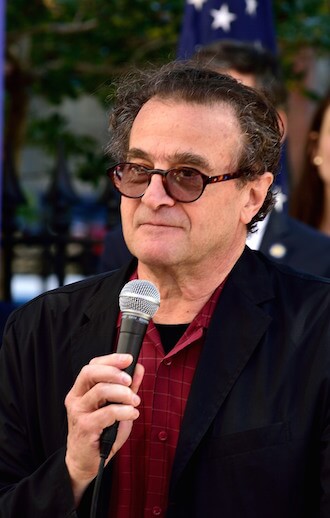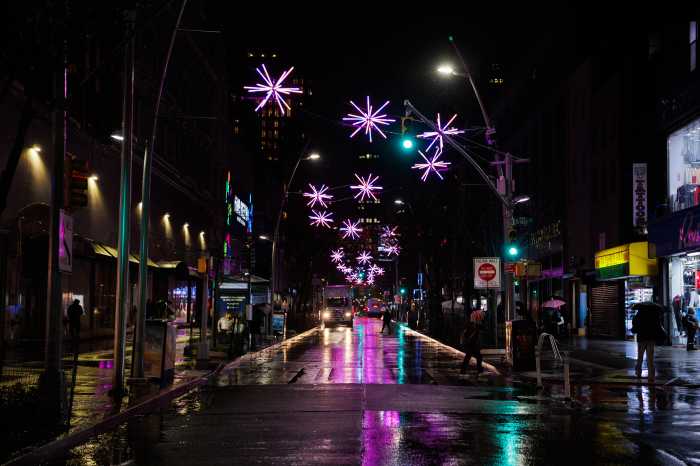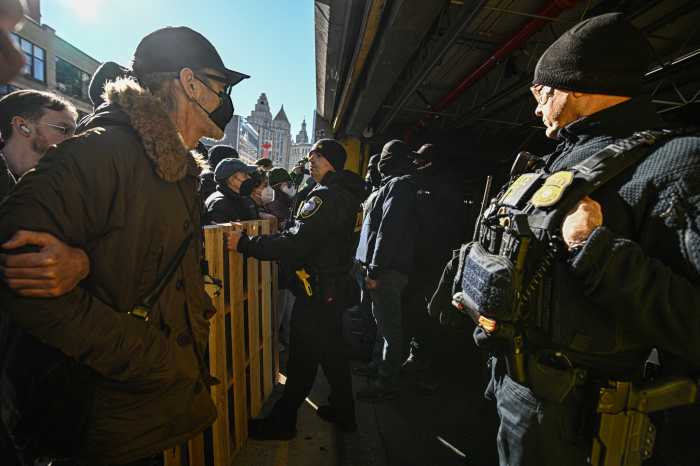The political, community, and activist stars are aligned to make the area outside the Stonewall bar, scene of the ‘69 rebellion that sparked the modern LGBT movement, a national park run by the National Park Service. In a rare display of unity, New York leaders from Congress, Albany, and City Hall stood with LGBT activists and West Village community leaders to call on President Barack Obama to use his power under the Antiquities Act to designate Christopher Park across the street from the bar the “Stonewall National Monument” that would anchor the park.
The exact parameters of the park have yet to be solidified, but it will require the intermediate step of New York City ceding the parkland to the federal government –– a move city officials and neighborhood leaders seem to be down with.
The press conference announcing the campaign, led by the private National Parks Conservation Association, US Senator Kirsten Gillibrand, and West Side Congressmember Jerry Nadler, took place on a placid, sunny late summer Sunday afternoon September 20 — a sharp contrast with the six sweltering nights of angry demonstrations in late June 1969 when police conducting a routine raid on the gay Stonewall Inn were met with fierce, militant resistance.
Decision rests with Obama, but hurdles here in New York remain as well
The spirit of Stonewall was resurrected by Martha Shelley, a Stonewall participant and founder of the Gay Liberation Front (GLF) that emerged in its wake. She said that it was the mass organizing that arose right after the rebellion that made the rebellion historic.
“GLF was a coalition of radical gays from those mainstream organizations, gay radicals from socialist organizations, and street queens and dykes who’d never been organized before,” she said. “We made alliances with other groups that shared our dreams of a just society, like the Black Panthers and the women’s liberation movement.”
In her eye-popping address (see full remarks here), she went on to celebrate the success of “in-your-face tactics” and bemoan the ongoing oppression of women and people of color, American militarism then and now, and the excesses of “the filthy rich.”
Nadler, who was credited by State Senator Brad Hoylman with “a terrific job” of building support for this designation through an almost “block-by-block” campaign, said it would be “the first unit within the park system dedicated to LGBT history.”
Nadler said, “You can now walk by the Stonewall Inn without knowing anything about the history that took place here. We’re fighting to make sure these stories are not lost.”
The Park Service was credited with being good at telling the story at historic sites. More than 65 percent of the nation’s 400 national parks are sites of historic or cultural interest.
Gillibrand was one of several speakers who linked the Stonewall to Seneca Falls, New York, which has a park built around its significance to the 19th century emergence of the women’s rights movement, and parts of Selma, Alabama, which has one explaining that city’s significance in the 1960s Civil Rights movement. The linkage of Stonewall, Seneca Falls, and Selma was one that Obama himself made in his second Inaugural Address.
Gillibrand said that subsequent victories for the LGBT movement “were borne from the modern equal rights movement launched at Stonewall.”
Democrats Nadler and Gillibrand are introducing legislation to make the Stonewall National Monument designation, but no one expects that to pass a Republican-led Congress. The Obama administration has yet to take a public stand on using his power under the Antiquities Act to make the park, but Nadler believes the president would do so once the necessary preliminary steps have been completed.
Congressmember Carolyn Maloney said, “This is already the heart and center of the LGBT movement in America,” the place the community gathers after victories, defeats, and tragedies. “We need the government to catch up with the people.”
Among the other political heavy hitters on hand to voice support for the campaign were Public Advocate Letitia James, City Comptroller Scott Stringer, Manhattan Borough President Gale Brewer, and Councilmember Corey Johnson, who, like Hoylman, represents the West Village.
Several other endorsements, perhaps more significant, came on Sunday as well. New York City Parks Commissioner Mitchell J. Silver was on hand, and he will be responsible for leading efforts within the administration of Mayor Bill de Blasio –– who has also voiced support for a park commemorating Stonewall –– to cede the land to the federal government. Also among the speakers was Tobi Bergman, chair of Manhattan Community Board 2 in Greenwich Village, which unanimously endorsed the idea but awaits a final proposal on what exactly the park will look like and whether it will include features such as a visitor’s center.
The park will not include the interior of the bar, which is not the original ‘69 dive bar design. The real estate company that owns it has been resistant to selling it, including to those who want to make it into a museum. But the city did landmark the exterior earlier this year, a designation that comes with more protection than its earlier ones from the National and New York State Registries of Historic Place.
Bergman called Stonewall “a place of liberation” that trumps some traditional neighborhood concerns about noise and congestion. But he doesn’t want the existing city park to change.
Gay civil libertarian Bill Dobbs, a spectator at the launch, said, “The federal designation sounds great, but let’s see the details –– especially how people who use the park are going to be treated.”
The park is already home to George Segal’s “Gay Liberation” statue of one gay and one lesbian couple and is a rare place in the West Village where neighborhood residents, including homeless people, can rest on benches.
The National Parks Conservancy Association is hosting a nationwide online petition to the president asking him to “use his executive authority to create a national park for Stonewall.” Go to NPCA.org for more information.
Historian David Carter, author of “Stonewall: The Riots that Sparked the Gay Revolution,” widely considered the definitive account of the events that June, was also in attendance. He said, “Our history has to be made an integral part of US history, and making this into a national park legitimizes that history.”





















